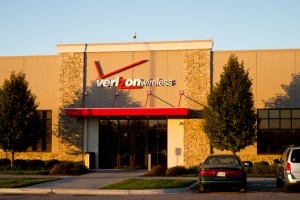U.S. law enforcement requested Verizon data over 320,000 times in 2013

By Josh Peterson | Watchdog.org
U.S. law enforcement agencies requested Verizon customer data more than 320,000 times in 2013, according to a recently published transparency report by the company.
TIF’d: Verizon received about $2 million in a TIF subsidy to open a call center in Lincoln, Neb.
Verizon published its semi-annual data transparency report Wednesday, revealing that U.S. federal, state and local law enforcement agencies requested information 321,545 times from the company in 2013.
The report, which covers Verizon’s wireline services such as phone, Internet, and television and the company’s Verizon Wireless services, details the number of subpoenas, orders, warrants, emergency requests and national security letters law enforcement presented to the company.
According to the report, Verizon was subpoenaed 164,184 times and presented 70,665 court orders and 36,696 warrants; law enforcement also made approximately 50,000 emergency requests for user data.
Between 1,000 and 1,999 national security letters, which are presented to a company by the FBI during a foreign intelligence investigation, were also sent to the company. Recipients of NSLs are placed under a gag order, prohibiting them from talking about the investigation.
Verizon also revealed that U.S. law enforcement agencies increased the number of demands made in 2013 from 2012, but didn’t specify the size of the increase.
The report, first announced in December, is part of a new trend of phone companies publishing information about law enforcement requests for user data. AT&T announced its intentions to follow suit in December as well.
Verizon acknowledges in its report that it sometimes rejects law enforcement data requests, but it didn’t publish the number of requests, or the kinds of requests, that it rejected in 2013.
“If a demand is facially invalid, or if a demand seeks certain information that can only be obtained with a different form of process (for example, a subpoena, rather than a warrant, improperly is used to seek stored customer content), we reject the demand,” said Verizon in the report.
“If a demand is overly broad or vague we will not produce any information, or will seek to narrow the scope of the demand and produce a subset of the information sought. In many cases we do not produce any information at all, including because the demand seeks information we do not have,” said the company.
Verizon stated in the report’s frequently asked questions, however, that it plans to publish that number going forward.
The company also said it didn’t track the percentage of demands it produced some or no data for in 2013, but stated it plans to publish that number going forward.
Computer security researcher Ashkan Soltani tweeted in response to the report, “Verizon transparency report is meaningless without knowing the number of users affected.”
In early January, CREDO Mobile, a San Francisco-based progressive organization with a small base of wireless subscribers, became the first phone company to publish a law enforcement transparency report. CREDO Mobile’s report also broke down the number of law enforcement requests by agency and by state, which is unique among transparency reports.
Major Internet companies, including Google, Microsoft, Twitter and Facebook, also regularly publish similar transparency reports.
Concerns about big data and government surveillance have put a spotlight on privacy issues, and technology companies looking to solidify consumer trust in their services have been willing to be more transparent about what they do with user data.
The national security leaks by former National Security Agency contractor Edward Snowden have inspired increased public pressure on telecommunications and technology companies to be even more transparent.
Contact Josh Peterson at jpeterson@watchdog.org. Follow Josh on Twitter at @jdpeterson
The post U.S. law enforcement requested Verizon data over 320,000 times in 2013 appeared first on Watchdog.org.







